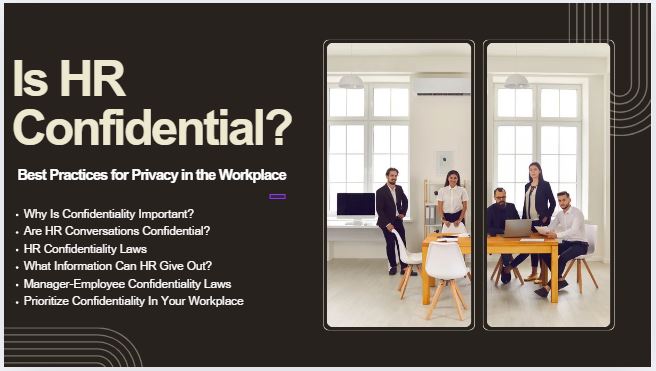
Introduction
Confidentiality in Human Resources (HR) is essential for building trust and ensuring a professional work environment. Employees rely on HR to handle sensitive matters discreetly, whether it’s about performance reviews, complaints, or personal data. But how confidential is HR really? Let’s explore HR confidentiality best practices, laws, and what information HR can and cannot share.
Why Is Confidentiality Important?
Confidentiality in the workplace protects employees’ personal and professional information, ensuring fairness and trust.
Here’s why it matters:
- Maintains Employee Trust – Employees are more likely to share concerns if they know their information is secure.
- Prevents Legal Risks – Mishandling confidential data can lead to lawsuits and reputational damage.
- Enhances Workplace Integrity – Protecting sensitive data upholds company ethics and compliance standards.
Are HR Conversations Confidential?
While HR handles confidential matters, absolute confidentiality is not always guaranteed. HR professionals must balance employee privacy with legal and organizational responsibilities. Some scenarios where HR may need to disclose information include:
- Investigations of Misconduct – HR may share details with management or legal teams.
- Compliance with Laws – HR must report cases involving harassment, discrimination, or illegal activities.
- Business Interests – In cases of layoffs, restructuring, or promotions, HR may discuss employee performance with leadership.
HR Confidentiality Laws
Various laws protect employee privacy and guide HR confidentiality practices, including:
- General Data Protection Regulation (GDPR) – Protects employee data privacy in the EU.
- Health Insurance Portability and Accountability Act (HIPAA) – Governs the confidentiality of health-related employee information in the U.S.
- Fair Credit Reporting Act (FCRA) – Regulates the use of background checks for employment decisions.
- Equal Employment Opportunity Commission (EEOC) Guidelines – Ensures non-discriminatory HR practices.
What Information Can HR Give Out?
HR must balance transparency with confidentiality.
Here’s what HR can and cannot disclose:
Information HR Can Share:
- Employment Verification – Basic details like job title, dates of employment, and salary range (with consent).
- Company Policies – Information about workplace rules and benefits.
- Legal Disclosures – HR must share information as required by law (e.g., harassment claims, safety violations).
Information HR Cannot Share:
- Employee Complaints or Grievances – Details about workplace complaints remain confidential.
- Performance Reviews – Unless necessary for promotions or disciplinary actions.
- Medical Records – Protected under privacy laws unless required by law or policy.
- Personal Employee Data – Addresses, social security numbers, or family details.
Manager-Employee Confidentiality Laws
Managers and HR professionals must adhere to confidentiality laws while handling employee concerns. Best practices include:
- Limiting Access – Only authorized personnel should have access to sensitive employee data.
- Using Secure Storage – Physical and digital records should be protected with encryption and restricted access.
- Training on Confidentiality – HR and managers must undergo regular confidentiality training to understand privacy laws.
Prioritize Confidentiality in Your Workplace
Maintaining HR confidentiality is crucial for fostering a safe and professional work environment.
Employers should implement the following strategies:
- Develop Clear Confidentiality Policies – Outline what information is confidential and how it will be handled.
- Educate Employees and Managers – Conduct training sessions on privacy best practices.
- Utilize Secure HR Systems – Implement secure databases and encryption to protect sensitive information.
- Encourage Open Communication – Ensure employees feel comfortable reporting issues, knowing their information is protected.
How a PGDM in HR Management Can Help
Pursuing a PGDM in HR Management equips professionals with the knowledge and skills needed to handle employee confidentiality effectively.
Key benefits include:
- Understanding Legal Frameworks – Gain expertise in HR laws and best practices.
- Mastering HR Technology – Learn to manage secure HR systems and databases.
- Building Ethical Leadership – Develop skills to handle sensitive situations with integrity.
Conclusion
HR confidentiality is essential for protecting employee trust and ensuring legal compliance. While HR cannot promise absolute confidentiality in all cases, following best practices and legal guidelines ensures sensitive information is handled responsibly. For HR professionals looking to advance their expertise, a PGDM in HR Management and Executive HR Management provides the necessary skills and knowledge to navigate these challenges effectively.


